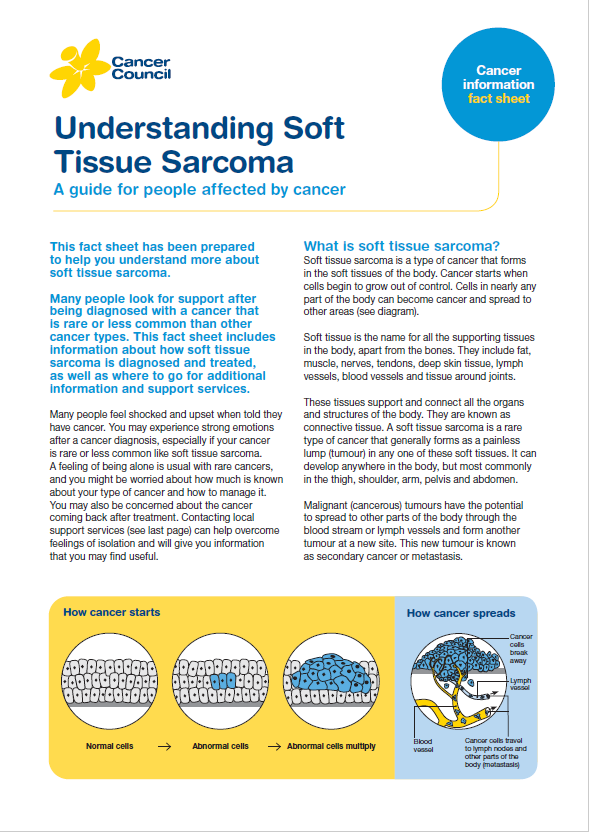- Home
- Soft tissue sarcoma
- Symptoms
Soft tissue sarcoma symptoms
Soft tissue sarcoma usually doesn’t cause symptoms in its early stages. As it grows over a period of months, you may develop a painless lump. You may begin to have pain as the lump grows and presses on nerves and muscles. Other symptoms will depend on where in the body the sarcoma is. Sometimes a soft tissue sarcoma may be mistaken for a benign fatty lump (lipoma) or bruise (haematoma). This can delay tests that would help make the right diagnosis.
One rare type of skin cancer, dermatofibrosarcoma protuberans (DFSP), can show as a flat, slightly raised or even depressed area of skin that may be violet, reddish brown or skin-coloured making it particularly hard to diagnose. While the original tumour is not technically a sarcoma, a small number of people with DFSP have ‘fibrosarcomatous transformation’ where the tumour may progress and show areas of fibrosarcoma, a type of soft tissue sarcoma from supportive tissue. See dermnetnz.org for more information.
Most people who develop a painless lump do not have a sarcoma. However, you should see your doctor if you notice the lump is getting bigger, is the size of a golf ball or larger, or is painful or tender.
→ READ MORE: Soft tissue sarcoma diagnosis
Podcast for people affected by cancer
Listen now
More resources
Dr Susie Bae, Medical Oncologist, Peter MacCallum Cancer Centre, VIC; Tony Bice, Consumer; Dr Denise Caruso, CEO Australian and New Zealand Sarcoma Association, VIC; Emma Gardner, Nurse Coordinator, Bone and Soft Tissue Unit, Peter MacCallum Cancer Centre, VIC; Jonathan Granek, Consumer; Thelma Lobb, Consumer.
View the Cancer Council NSW editorial policy.
Need to talk?
Support services
Coping with cancer?
Speak to a health professional or to someone who has been there, or find a support group or forum
Need legal and financial assistance?
Pro bono services, financial and legal assistance, and no interest loans
Cancer information
What is cancer?
How cancer starts and spreads
Resource hub
Guides, fact sheets, videos, podcasts and more for people with cancer, their families and friends

